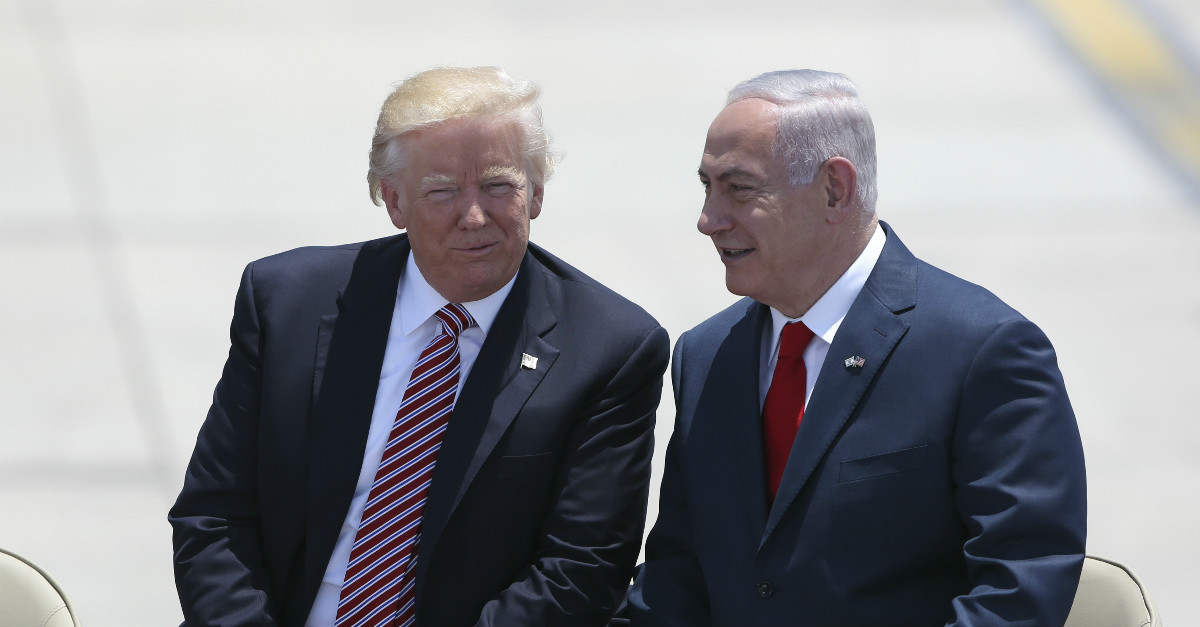There’s no better time to play peacemaker than when you’re under a heavy cloud of intrigue. President Donald Trump’s visit to Israel today and his short stop tomorrow in the West Bank is the opportunity that he and his staff dreamed of: finally, the Russia investigation isn’t the only subject the media is talking about.
Videos by Rare
Trump was giddy as he stepped off Air Force One to a red-carpet welcome at Ben Gurion International Airport. Prime Minister Benjamin Netanyahu and his cabinet were on the tarmac, waiting for him with smiles and outstretched hands.
Trump is in Tel Aviv, of course, to reaffirm yet again the unshakable bond between the United States and Israel, a relationship that has been shaken a little since reports surfaced that Trump disclosed Israeli intelligence to the Russians. But beyond just mending fences, he’s also there to sound out how realistic the prospect of a peace process is in the current environment.
RELATED: While Donald Trump boogied with Saudi princes, Iran was voting for openness and peace
“We have before us a rare opportunity to bring security and stability and peace to this region and to its people,” Trump declared, “defeating terrorism and creating a future of harmony, prosperity and peace.” That’s the president’s hope, at least. The reality of Israeli-Palestinian peacemaking, however, is that Netanyahu and Palestinian President Mahmoud Abbas are stubborn beyond belief and rarely willing to give an inch unless the other side does the same. And when the Israelis do offer confidence-building measures like they did last weekend—keeping the Allenby Bridge between the West Bank and Jordan open for 24 hours, allowing Palestinians to build in certain parts of Area C, and easing transportation of Palestinian workers into Israel—Ramallah calls them insufficient.
On the Israeli-Palestinian conflict, Trump has good intentions. He genuinely wants to resolve the generations-long impasse between the two sides (even if it’s just to get some positive coverage), and he’s been taking actions over the past four months that indicate he’s serious about getting the parties closer to a process, dispatching his envoy to meet with as many voices as possible and declining to move the U.S. embassy to Jerusalem, among them.
RELATED: Trump’s first 100 days: Capitulating to the destructive status quo on foreign policy
But Trump doesn’t seem to appreciate how enormously difficult arriving at a resolution will be. The two parties actually have to cooperate for any diplomatic process work. This isn’t a real-estate deal where you can bully the parties into an agreement; it’s a vastly complex dispute with political, ethnic, historical, and religious undertones. It’s not about building a skyscraper or a hotel, but getting together two peoples that have been in conflict for so long that even positive overtures are viewed as political ploys to make the other side look like the unreasonable party.
The real test of Trump’s negotiating abilities will come when he needs to persuade Netanyahu and Abbas that their political calculations are better served with a settlement than with the status quo. If he can accomplish that, the Russia story will truly be buried in the back pages—just don’t hold your breath.



